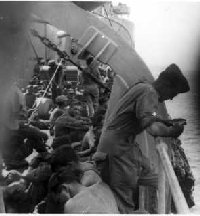David had always seen himself as fair, considerate, honest, forthright, and even noble at times, but none of these traits fit the David who had played with the affections of a girl who loved him, to whom he had lied, and to whose father he was about to lie. He was behaving abominably, and the greatest shock to his psyche came from the realization that he was less than perfect. For all his supposed ideals, for all his professed humanity, when it came down to everyday human interplay, he found himself wanting.

God, but he had fallen into a cornucopia of loving! An unforgettable feast! Not the kisses, but the passion of its delivery, the desire that powered it. Not the feel of his arms around her, but the responses his roaming fingers awakened, responses evoking responses evoking responses . . .until two strangers entwined in unabashed fury.
David thought of the enemy only in turns of Germany, not Nazism. He refused to differentiate between the two. He strongly felt that separating them permitted the naive to overtly admire German culture, science, and their efficiency while placing the blame for that nation's personality aberration on a foreign termite that bored its way into its psyche when its defenses were at its weakest during the Great Depression. Nonsense! Nazism was Germany and Germany was Nazism.

Celeste was the quint essential assimilated Jewess. She called herself 'An American of the Jewish persuasion.' Judaism, to her, was a religion full of antiquated beliefs that required modernizing. Having been protected all her life, and having received most of life's advantages, she was outgoing to the extent that David could never be. Much of him lay hidden in corners that he would refuse to exhibit to the world or examine by light of day. These were the damaged, the tattered spots of his life that would never heal, the Jew-wounds that had penetrated deep into his soul, festering in the darkness, forever smoldering like a peat fire, and perennially in conflict with the very Jewish-American norms with which Celeste was endowed.
He was not an atheist and believed in God, but prided himself that he had neither need nor time for Him in his busy world. For he had not felt God, but had reasoned him into existence . . . Faith may be a rock on which to build a doctrine, but reason rested on shifting fault lines . . . God, he equated, to a landlord renting an apartment who, after laying down a few basic rules as a condition of occupancy, left the tenants to their own devices, forgetting to warn them that all repairs would be on their own account . . . There was a time he believed God existed only in ignorance, in the blank, yet unexplored spaces between knowledge. God, then, would be an ever shrinking phenomena as science relentlessly pushed back ignorance's frontier. But in this lay a fallacy and a contradiction, and he had discarded the notion. Instead of one's awe of Him diminishing with knowledge gained, the brilliance of his handiwork became more obvious, more inspiring. Godship, David was certain, would forever elude man.

He was in the army just a couple of weeks and already the human rot, which he thought he had left behind now that he and the goy were comrades, fighting the good fight together, had already begun to appear. Before he could fight Hitler, he would have to fight for acceptance. Acceptance was the gold ring on the merry-go-round of Jewish life, earned by double sweat, double brains, and double everything else, just so he could hear some well-meaning goy say, "You're a good Jew David." But how could he win acceptance, he wondered in despair, when they judged him through myopic lenses that they ground and polished a lifetime to refract only the light of their dogma? Why must a Jew fight so fiercely for something the meanest gentile could obtain without effort? . . . And as the realization of the endless burden he must bear throughout his life crashed through his chimerical wall of youthfull hopes and ideals, he felt a sudden flush of extreme exhaustion wash over him, leaving him wondering if he could take a lifetime of this shit.
Although Lieutenant Dupris encouraged a self portrait of aloofness and favored the swagger stick and a tailor-made uniform, under pressure he always spoke softly and gently and had about him a grace that reminded David of those paragons of antibellum gentry that he had read about or had seen in films. Coming from the Bronx, as he did, where the proletariat and the mundane held sway, David recognized in the lieutenant a level of aristocracy that the Jew could never attain in America. He could never develop the confidence and bearing in this hothouse of Jewish aparthied, and it left him with a gnawing feeling of inadequacy and failure. And for the first time in his life he felt cheated being born a Jew, leaving him saddened and angered.